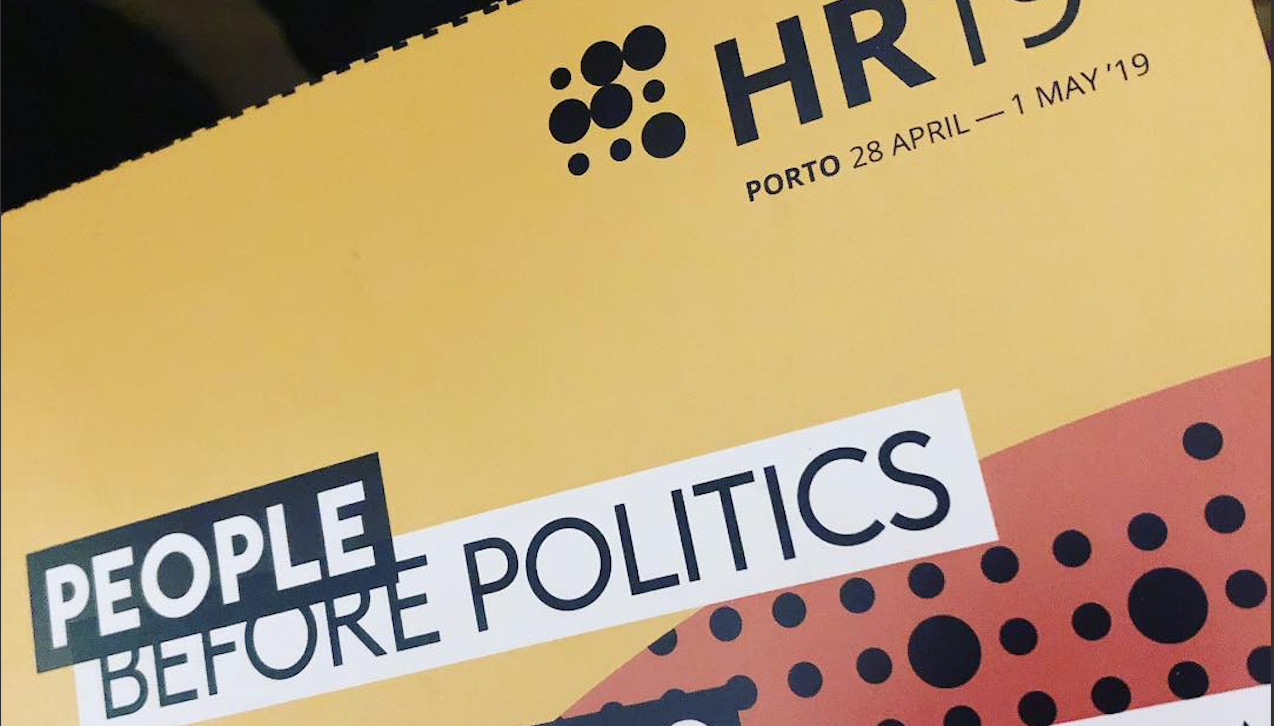#HR19: People before politics!
This was the main message of the 26th International Conference on Harm Reduction (#HR19), which was held from April 28 to May 1 in Porto city (Portugal). The conference is one of the key global platforms in the field of health care, at which top-level harm reduction issues are raised.
This year at #HR19, a number of countries presented their successful experience in implementing harm reduction programs that had a direct impact on improving the public health situation in a particular region and improving the quality of life of people who use drugs, their families and communities.
Participants #HR19 started talking about Ukraine at the opening ceremony of the conference. Ukrainian Andriy Yarovyi, who was illegally detained and convicted in the temporarily uncontrolled territory of the Luhansk region, the so-called “LPR”, was presented with the prestigious international award “Carol and Travis Jenkins Award” (watch video). Note that it is awarded on annually since 2005.
In 2019, Ukraine’s advanced experience was presented in a series of discussions at the 26th International Conference on Harm Reduction.
Andriy Klepikov, Executive Director of the Alliance for Public Health, called on donor governments to allocate funds for the work of the Global Fund to Fight AIDS, Tuberculosis and Malaria. He stressed that these funds play a critical role in stopping the HIV/TB epidemics in the EECA region.
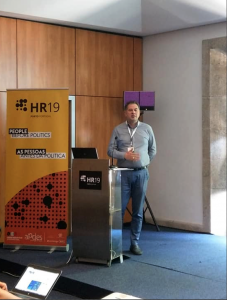 Mr. Klepikov spoke about a working harm reduction program in Ukraine, which had a significant impact on reducing the dynamics of the HIV/AIDS epidemic. The program itself in the country of harm reduction in the country has existed for over 15 years. Initially, it was limited mainly to the exchange of syringes, the distribution of condoms and the holding of groups. Since 2008, with the support of the Global Fund in Ukraine, a substitution therapy program has been introduced. Today, as a successful practice, it is exemplified at expert sites at various levels.
Mr. Klepikov spoke about a working harm reduction program in Ukraine, which had a significant impact on reducing the dynamics of the HIV/AIDS epidemic. The program itself in the country of harm reduction in the country has existed for over 15 years. Initially, it was limited mainly to the exchange of syringes, the distribution of condoms and the holding of groups. Since 2008, with the support of the Global Fund in Ukraine, a substitution therapy program has been introduced. Today, as a successful practice, it is exemplified at expert sites at various levels.
“On the example of Ukraine, we see the effectiveness of preventive programs that are gradually moving from donor to state funding this year. In the process of transition, it is important to keep these programs working, high-quality and efficient, so that they continue to contain the epidemic”, – said Andriy Klepikov.
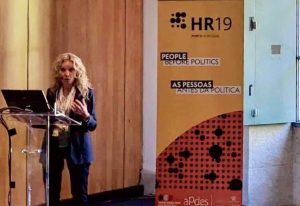 Techniques to improve the HIV cascade were presented at separate sessions.
Techniques to improve the HIV cascade were presented at separate sessions.
Testing innovations and experience in organizing assisted self-testing for HIV in Ukraine were presented by Tatyana Salyuk, director of the METIDA project of the Alliance for Public Health.
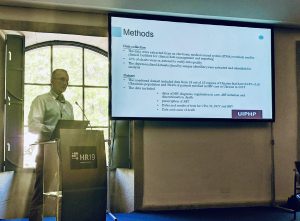 Konstantin Dumchev, scientific director of the Ukrainian Institute of Public Health Policy, spoke about adherence to ART and reducing the viral load among HIV patients in Ukraine who use drugs.
Konstantin Dumchev, scientific director of the Ukrainian Institute of Public Health Policy, spoke about adherence to ART and reducing the viral load among HIV patients in Ukraine who use drugs.
A separate leitmotif emphasized the role of cities in improving people’s health. At the session on the role of cities in local drug policy, there were examples from Ukraine to strengthen funding for harm reduction programs in cities, drug testing, and work with city police.
They also told in Porto about the first Ukrainian harm reduction office in the EECA region, which opened in December 2018 on the basis of the regional narcological dispensary in Sumy (Ukraine).
The effectiveness of such cabinets has been scientifically proven for a long time, and this is the first space of this kind in the countries of Eastern Europe and Central Asia, which exists through local funding. The additional funds provided by the Public Health Alliance and the International Renaissance Foundation were needed only to launch the project, including repairs and equipment for the premises. For official work of the cabinet a special package of documents was prepared. The organization and opening of the cabinet was coordinated by the harm reduction activist, the head of the Freezone organization, Alexey Zagrebelny.
Tatiana Deshko, Head of the International Programs Department of the Alliance for Public Health, told about the success of urban initiatives on HIV / TB in EECA cities and, in particular, the program in Odessa.
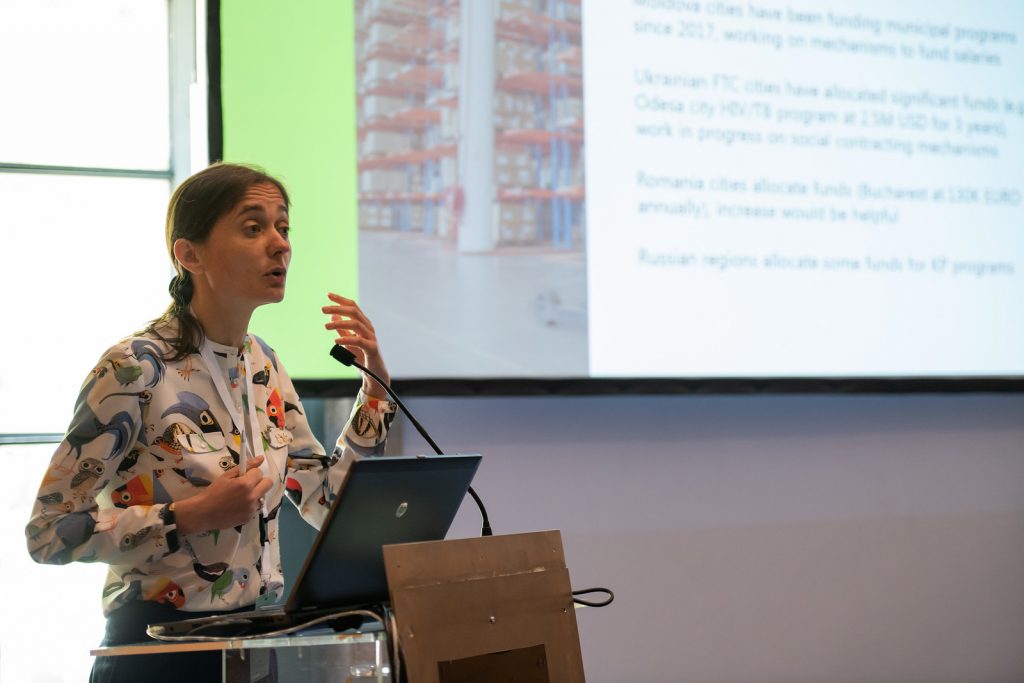
Tetiana Deshko at the Harm Reduction International Conference 2019 in Porto, Portugal. ©Jared Krauss/HRI
Two years ago, within the framework of the regional public health alliance project “Accelerated response to the HIV/TB epidemic among key populations in Eastern Europe and Central Asia”, the Odessa Municipality joined the global initiative of the Track Track Cities, aimed at overcoming the HIV/AIDS epidemic by 2030.
The joint work of the Alliance, the Odessa Municipality, NGOs partner and representatives of key groups led to an increase of 50% in the number of patients receiving ARV therapy. For comparison, in Kyiv, which is also the city of the initiative of Fast Track Cities, over the same period, progress was 43%, and even less all over Ukraine – only 37%.
27,378 representatives of key groups were covered with HIV prevention services, of whom 17,430 were people who inject drugs (84% of the estimated number). Mortality due to HIV in Odessa decreased by 19% from 117 people in 2017 to 95 people in 2018.
“It is extremely important that the funds allocated in 2018 work in harm reduction programs in Odessa. The distribution of syringes for the program’s funds through pharmacies has already begun. We are waiting for the most important decisions on social contracting, which will allow the program funds to be directed to the low-threshold services of the city’s NGOs”, – Tatiana Deshko noted.
They spoke at the 26th International Conference Porto and about the Ukrainian project on harm reduction for young people who are experimenting, Drugstore. Representatives of the Elton John AIDS Foundation spoke about the project, talked about it at a press conference, and participants in HR19 discussed Drugstore on the sidelines.
Video broadcasts of the conference sessions can be viewed here.
Text: Inna Gavrylova

